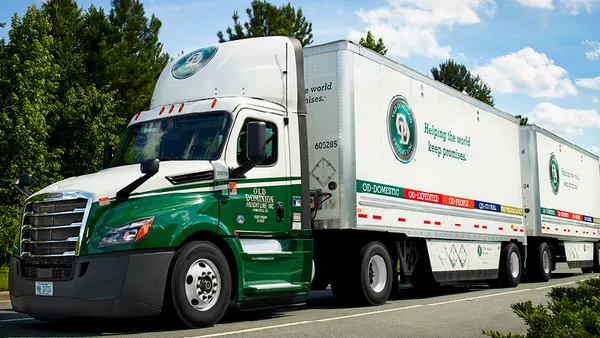Dive Brief:
- Spot load posts on the DAT load board were up nearly 68% YoY in January, but truck posts moved in the other direction, falling 18% YoY, creating an environment of rising rates and tight capacity for shippers on the spot market.
- This led the DAT load-to-truck ratio to shoot up across trucking modes, rising 92% YoY for van, 181% YoY for flatbed and more than 54% YoY for reefers.
- Spot rates followed the rising demand and were up almost 26% YoY for van, nearly 15% YoY for flatbed and 16% YoY for reefers.
Dive Insight:
The trucking market is benefiting, as is every other freight mode, from the high demand for consumer goods in recent months that has led to an impressive surge in imports at ocean gateways. And once those containers land, it is trucks and rail that are responsible for getting them to where they need to be.
"This tightness is driven largely by the supply side, with ongoing congestion at some of the major ports and a driver shortage," XPO Logistics Chief Strategy Officer Matt Fassler said on the company's earnings call Thursday when talking about its brokerage business. "There has been some loosening in capacity from the seasonal peak, which helps us with procuring capacity for our customers."
In a research note published Friday, UBS noted that several companies reported strong brokerage results due to the tight market environment.
"Brokerage mix in 4Q20 was ~35% /65% spot to contract, and we anticipate that continued tightness in the freight market and increased market participation in digital pricing systems will be tailwinds for XPO's ability to capture pricing in 1Q21," UBS said of XPO's results for the quarter.
YRC, which changed its name to Yellow, CEO Darren Hawkins similarly placed the tight capacity issues on the driver shortage and said the company is focused on recruitment.
"Right now the consumer is standing up well," Hawkins said. "Construction is strong. Manufacturing is looking good. I am confident from a customer perspective and the demand levels we're seeing that pricing will remain favorable."
With capacity tight and pricing power in the carriers' hands, shippers are having to shell out more to get capacity for their freight. Figures from the Coupa Business Spend Index show that business spending on shipping and freight was up more than 12% YoY in the last quarter.
As spot rates increase, the uptick is spilling over into contracts. Contract rates overtook spot rates for the first time in seven months, according to figures from DAT.
Carriers say that shippers are simply looking for dependable partners in the tumultuous environment.
"They're just looking for consistency," said Dustin Koehl, U.S. Xpress senior vice president of sales. "In service rates and capacity."
Fleets are working to expand capacity beyond working to add drivers. Trailer orders were up 94% YoY in January, according to emailed figures from ACT Research. Class 8 truck orders surpassed 40,000 in January for the fourth-consecutive month.
But for now, the market could remain tight as long as the pandemic continues.
"Even if freight demand were to stall, though, unusual constraints on the supply of drivers likely will prolong tight capacity," FTR Vice President of Trucking Avery Vise said in a statement. "We expect a noticeable loosening as the pandemic fades and millions of Americans rejoin the labor pool."
This story was updated with YRC's name change.














